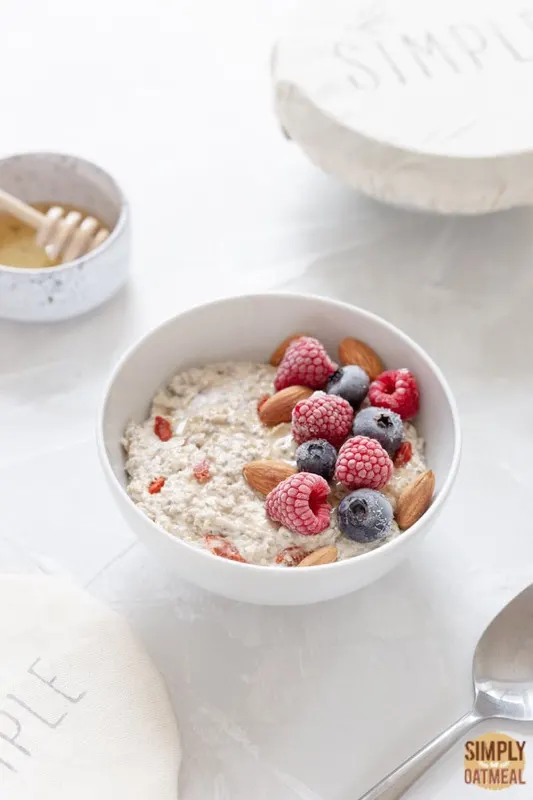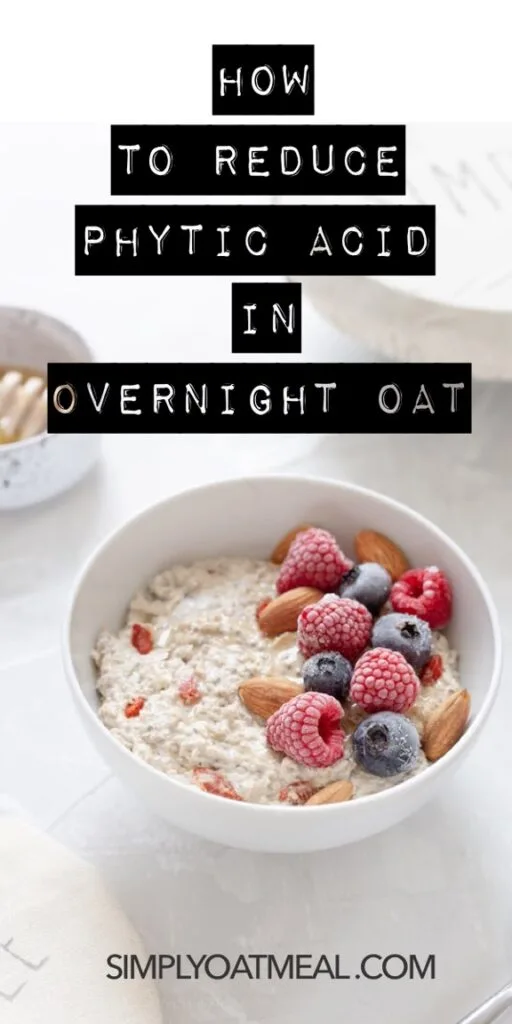Trying to eat healthily often leads to multiple points of confusion in this day and age. Every week we hear about a new “superfood,” or maybe that a previous one isn’t as great as once touted to be.
I strongly advocate listening to new advice, and giving it a try for yourself to see how your body reacts. Allow your body to tell you what’s right and whats wrong in each equation.
So, how do you reduce phytic acid in overnight oats? The best way to eliminate phytic acid in oats is to soak them in liquid, with a splash of apple cider vinegar or lemon juice, for 12 to 16 hours before eating.
However, we are all different! While one person may benefit from a low-carb diet, the other person may experience an adverse reaction.
Even though I love to eat overnight oats every day, that does not always guarantee the same circumstance for others.
If you curl up in pain the minute you go near soaked oats, then phytic acid may be one of the oat side effects to blame. Here are a few ways you can improve your digestion of this enzyme without having to restrict yourself too much.
What are overnight oats?
Make overnight oats by soaking oats in liquid following a basic overnight oats ratio of 1½:1 liquid to oats. The soaking is usually done overnight so that the phytic acid dissipates, and then no cook oatmeal is ready to eat the very next day.
Steel cut oats, rolled oats or quick oats are generally available in every market, however they are not the only kinds. Rolled oats are best type for overnight oats, but there are recipes using the other kinds too.
Overnight oats can be made with water, almond milk, oat milk or really any liquid you enjoy
I have been dedicated to exploring a wide range of overnight oats recipes, which allowed me to play around with no cook oatmeal flavors like blueberry muffin, caffè mocha and pumpkin spice latte.
With all the wild combinations available, I generally stick to the same basic formula: old-fashioned oats, chia seeds, dairy free milk, nut butter, berries and a pinch of salt.
When I add nuts, chia seeds, or protein powder, I always increase the liquid to oats ratio to 2:1, otherwise I follow the basic overnight oats ratio. This is because the mix-ins will absorb additional moisture so the ratio needs to compensate.
Are overnight oats good for you?
In relation to the phrase, “you are what you eat,” well yes overnight oats are healthy. The fact of the matter resides in the overall benefits of oats, and the vessel of transport for nutritious superfood ingredients and toppings.
Oats offer healthy fats, plant based protein and both soluble and insoluble fiber. Beta-glucan is a soluble fiber present in oats that has been proven to be good for weight loss.
When comparing overnight oats to cooked oatmeal, it seems that soaking oats is more nutrias because they have had a chance to ferment. The fermentation process allows the growth of beneficial bacteria that help the gut microflora present in the digestive tract.
With all the health goals, it must noted that overnight oats is a vehicle that often includes a wide range of additions. Stay away from adding excess sugar, extremely high fats and overly process ingredients, then the meal prep will remain wholesome, hearty and packed with nutrition.
What is phytic acid?
Phytic acid is a unique natural substance found in many cereal grains, oil seeds, legumes and nuts.
Phytic acid reduces the ability for your body to absorb iron, zinc and calcium, which can inevitably lead to mineral deficiencies if left unchecked [1].
As a result, phytic acid is often referred to as an anti-nutrient.
Although it can potentially impair the absorption rate of essential minerals, this is often not the case for those following a balanced diet.
There are a number of health benefits of phytic acid. Therefore, as with most things in life this tends to be more complicated that initially thought.
Can you reduce phytic acid in oats?

Avoiding all foods that contain phytic acid is not recommended because a majority of them are actually healthy and nutritious.
Furthermore, many people that stick to vegan and vegetarian diets rely on grain, legumes and nuts as a source of plant-based protein, which is an essential part of a balanced diet.
There are several preparation methods that allow us to successful reduce the amount of phytic acid in foods, including oats. Cooking is one of the easiest ways to reduce the about of phytic acid in oats, but that defeats the point of overnight oats.
Soaking, sprouting and fermentation are the most common methods to reduce phytic acid without cooking [2].
To successfully sprout oats, you would have to soak the oat groats or whole kernels.
Furthermore, fermentation would likely transition into subjects like beer making, bread making or food preservation methods like kimchi, which uses a slight amount of rice flour to help thicken the sauce to better coat the vegetables.
As a result, this leaves us with soaking. There are many types of oats, but rolled oats are most commonly used for this technique.
It is a common misconception that rolled oats are a raw food, but this is not the case.
Rolled oats are steamed before being rolled in large mills so that they don’t crack under the pressure of the large rollers, therefore they are partially cooked in the process.
Best way to reduce phytic acid in overnight oats
Even though you soak the oats while making overnight oats, you are still consuming the soaking water that contains the phytic acid.
After doing more research about the soaking oats, I realized that there are two ways to supercharge your soaked oats and successfully neutralize or reduce the phytic acid in your soaked oats.
Soak and drain: This is the most efficient way to remove the phytic acid. Add sufficient amount of water to allow your oats to soak overnight without fully absorbing all of the liquid. The next day, drain the remaining liquid and rinse the oats before mixing with your favorite add-ins and toppings.
Neutralize the phytic acid: Soaking oats overnight with a splash of fresh lemon juice or apple cider vinegar will help to neutralize the phytic acid within the soaking liquid. As a result, you can consume the soaked oats and your body is able to activate the digesting enzymes that absorb the available minerals.
If you want to make your breakfast porridge truly healthy, then soak oats overnight in either water with a pinch of salt and drain the liquid the next day, or make a bircher muesli containing oats soaked overnight in natural yogurt, grated apple and lemon juice.
The next day, add oatmeal toppings like honey, cinnamon, nuts, dried fruits, coconut and berries.

Phytic Acid In Overnight Oats: Final Thoughts
Overnight oats have beee around for a long time, and have no intention on disappearing anytime soon. With the endless flavor combinations, toppings and mix-ins available, there are countless reasons why you need to add this superfood packed meal prep to your regular routine.
Even though rolled oats are not raw, they have not been steamed or cooked for long enough to eliminate the phytic acid naturally present in the oat. Therefore, it is important to take certain precautions to minimize the exposure.
Soaking the oats in liquid for a minimum of 12 hours helps to expel the phytic acid from the oats. Draining and rinsing will wash away the most, however that will also take some of the essential nutrients along with it.
The best way to reduce phytic acid in oats is by soaking the oats with a splash of acid to help neutralize the pH level. Add apple cider vinegar or lemon juice to the soaking liquid, and you will have a delicious batch of no cook oatmeal that is ready to quench your hunger the very next day.

Carel
Tuesday 21st of March 2023
Joshua, side question if I may? www.myfooddata.com shows that uncooked oats nutrition vs cookes oats is like million times better, in all aspects, especially amino acids and minerals. This site pulls from USDA.
Interesting... But I do wonder how correct it is.. Your guess? Thanks
Joshua
Wednesday 22nd of March 2023
Hello Carel, thanks for reaching out. In general, the serving size or portion is based on weight or volume. Uncooked oats are a dry good, while cooked oats have already been hydrated by water. As a result, cooked oats weight and take up 4 times as much as dry raw oats. This would explain why uncooked oats have more nutrition that cooked oats.
Mate
Wednesday 8th of March 2023
I soak my oats with lemon juice and we eat them for a couple of days.
Theodora
Friday 17th of February 2023
Reading this post and the comments was very helpful! Thank you! I have a couple of questions in case you're still responding. I'm not in the US, and in my country what's sold in the supermarkets is just called oats. Oat flakes to be exact, so I'm not sure if it's the same as steel cut or rolled oats or something else. I usually soak them in water for half an hour. When people say cooked oats they mean heated in the microwave? That's not very popular here, once I tried soaking them in boiled water to see what it'd be like and I didn't really like it. So my question is, what's the minimum amount of time we can soak them in room temp water for it to have any effect on lectins/phytic acid? Assuming we're all talking about the same oats :) Also, I was wondering what would be the maximum amount of time. Maybe up to 3 days or so? Thank you!
Dick Frase
Monday 7th of November 2022
Can you give an actual measurement for "splash" of lemon juice or apple cider vinegar? Thanks
Dick Frase
Monday 7th of November 2022
@Joshua, Thanks for clarifying. I made my first oats over the weekend and they turned out great. Only problem was I had stomach issues the following day so am thinking I need to address that before making more. I'll add in either ACV or Lemon Juice and/or try soaking just the oats overnight in water and then draining/rinsing before mixing in the rest. Thanks again. Dick
Joshua
Monday 7th of November 2022
Between a teaspoon and tablespoon based upon a ½ cup of dry rolled oats and your personal taste preference.
J.
Tuesday 13th of September 2022
Hi, thanks for this information. My question: what apple cidar vinegar do you recommend? Can I use regular store bought 5%, or does it have to be fresh, or the Briggs Mother cidar?
J.
Tuesday 13th of September 2022
@Joshua, Thank you for responding. So, if I use the box label cider, it will still work at breaking down the phytic acid in the oats, correct?
Joshua
Tuesday 13th of September 2022
In our house, we use the Braggs organic raw apple cider vinegar. We jsut prefer it over big box labels and the fact it has the mother, is raw and organic work best for us. Hope this helps.